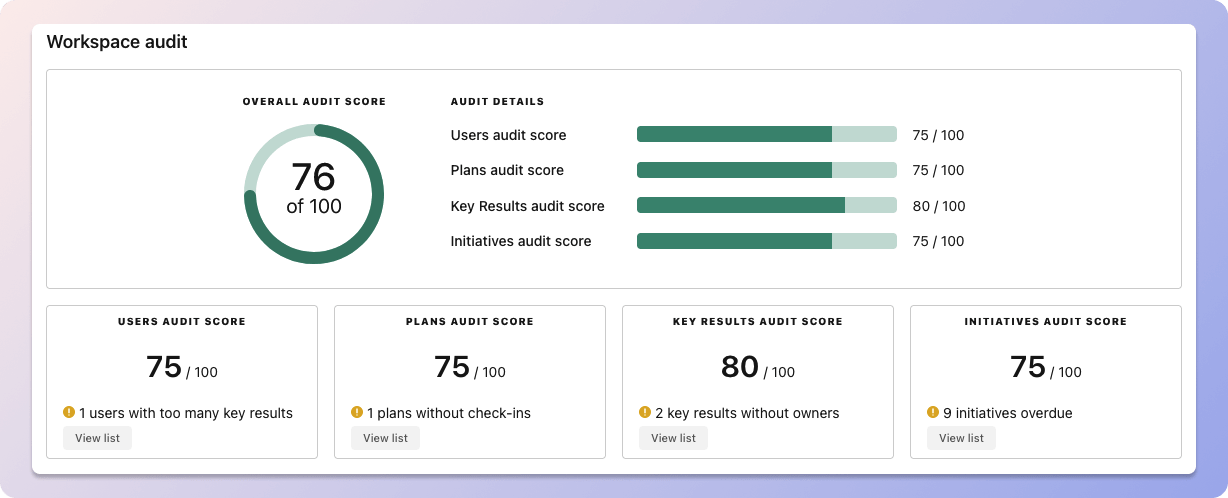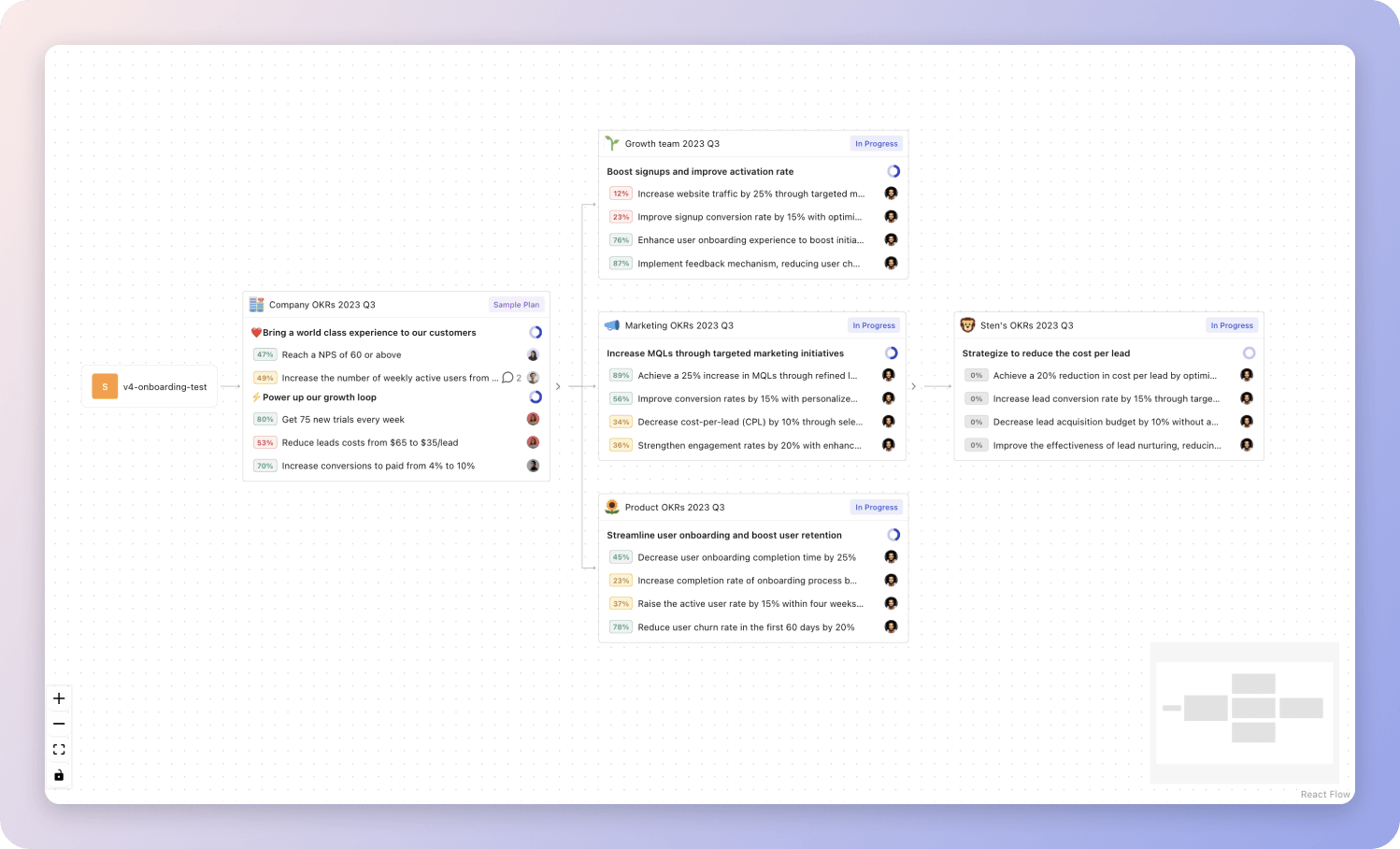4 OKR examples for Cloud Infrastructure Team
What are Cloud Infrastructure Team OKRs?
The OKR acronym stands for Objectives and Key Results. It's a goal-setting framework that was introduced at Intel by Andy Grove in the 70s, and it became popular after John Doerr introduced it to Google in the 90s. OKRs helps teams has a shared language to set ambitious goals and track progress towards them.
Crafting effective OKRs can be challenging, particularly for beginners. Emphasizing outcomes rather than projects should be the core of your planning.
We've tailored a list of OKRs examples for Cloud Infrastructure Team to help you. You can look at any of the templates below to get some inspiration for your own goals.
If you want to learn more about the framework, you can read more about the OKR meaning online.
Best practices for managing your Cloud Infrastructure Team OKRs
Generally speaking, your objectives should be ambitious yet achievable, and your key results should be measurable and time-bound (using the SMART framework can be helpful). It is also recommended to list strategic initiatives under your key results, as it'll help you avoid the common mistake of listing projects in your KRs.
Here are a couple of best practices extracted from our OKR implementation guide 👇
Tip #1: Limit the number of key results
The #1 role of OKRs is to help you and your team focus on what really matters. Business-as-usual activities will still be happening, but you do not need to track your entire roadmap in the OKRs.
We recommend having 3-4 objectives, and 3-4 key results per objective. A platform like Tability can run audits on your data to help you identify the plans that have too many goals.
 Tability's audit dashboard will highlight opportunities to improve OKRs
Tability's audit dashboard will highlight opportunities to improve OKRsTip #2: Commit to the weekly check-ins
Don't fall into the set-and-forget trap. It is important to adopt a weekly check-in process to get the full value of your OKRs and make your strategy agile – otherwise this is nothing more than a reporting exercise.
Being able to see trends for your key results will also keep yourself honest.
 Tability's check-ins will save you hours and increase transparency
Tability's check-ins will save you hours and increase transparencyTip #3: No more than 2 yellow statuses in a row
Yes, this is another tip for goal-tracking instead of goal-setting (but you'll get plenty of OKR examples below). But, once you have your goals defined, it will be your ability to keep the right sense of urgency that will make the difference.
As a rule of thumb, it's best to avoid having more than 2 yellow/at risk statuses in a row.
Make a call on the 3rd update. You should be either back on track, or off track. This sounds harsh but it's the best way to signal risks early enough to fix things.
Building your own Cloud Infrastructure Team OKRs with AI
While we have some examples below, it's likely that you'll have specific scenarios that aren't covered here. There are 2 options available to you.
- Use our free OKRs generator
- Use Tability, a complete platform to set and track OKRs and initiatives
- including a GPT-4 powered goal generator
Best way to track your Cloud Infrastructure Team OKRs
OKRs without regular progress updates are just KPIs. You'll need to update progress on your OKRs every week to get the full benefits from the framework. Reviewing progress periodically has several advantages:
- It brings the goals back to the top of the mind
- It will highlight poorly set OKRs
- It will surface execution risks
- It improves transparency and accountability
Spreadsheets are enough to get started. Then, once you need to scale you can use a proper OKR platform to make things easier.
 Tability's Strategy Map makes it easy to see all your org's OKRs
Tability's Strategy Map makes it easy to see all your org's OKRsIf you're not yet set on a tool, you can check out the 5 best OKR tracking templates guide to find the best way to monitor progress during the quarter.
Cloud Infrastructure Team OKRs templates
We've covered most of the things that you need to know about setting good OKRs and tracking them effectively. It's now time to give you a series of templates that you can use for inspiration!
You will find in the next section many different Cloud Infrastructure Team Objectives and Key Results. We've included strategic initiatives in our templates to give you a better idea of the different between the key results (how we measure progress), and the initiatives (what we do to achieve the results).
Hope you'll find this helpful!
OKRs to increase efficiency and scalability through cloud deployment
Increase efficiency and scalability through cloud deployment
Enhance data security by implementing robust cloud security protocols and achieving compliance certifications
Conduct a comprehensive review of current cloud security protocols and identify weaknesses
Regularly monitor and assess cloud security protocols and update as needed
Develop and implement an updated cloud security framework based on industry best practices
Ensure all necessary compliance certifications are achieved and regularly maintained
Achieve a minimum of 99.9% uptime by ensuring seamless integration and high availability in the cloud
Improve response time by optimizing cloud infrastructure to achieve 20% faster application performance
Analyze current cloud infrastructure to identify performance bottlenecks hindering application response time
Optimize code and queries by analyzing and improving inefficient code segments
Utilize content delivery network (CDN) for faster content delivery and reduced latency
Implement caching mechanisms to store frequently accessed data and minimize database calls
Reduce infrastructure costs by migrating 80% of applications and services to the cloud
OKRs to efficiently migrate services and databases to Google Cloud
Efficiently migrate services and databases to Google Cloud
Achieve minimal downtime during the migration process
Conduct regular communication regarding the migration process with all relevant stakeholders
Perform a thorough assessment of the existing infrastructure and identify potential issues
Develop a detailed migration plan with clear timelines and allocated resources
Implement redundancy measures and backup systems to minimize the impact of any disruptions
Optimize costs by analyzing and implementing cost-effective solutions in Google Cloud
Identify and eliminate any unnecessary services or resources to reduce expenses
Regularly monitor and review cost reports and adjust strategies accordingly
Research and implement more cost-effective alternatives or optimized configurations for existing services
Conduct a thorough analysis of current Google Cloud services and associated costs
Ensure seamless data migration from existing databases to Google Cloud
Perform necessary data cleansing and transformation to ensure compatibility with Google Cloud
Assess current database structure and data volume for smooth migration planning
Create a detailed data migration strategy outlining steps, tools, and timelines
Execute step-by-step migration process, verifying data integrity and minimizing downtime
Successfully migrate all services from current platform to Google Cloud
OKRs to acquire GCP certification with strong knowledge and skills
Acquire GCP certification with strong knowledge and skills
Receive positive feedback from a GCP certified professional on the project implementation
Implement any suggested improvements or modifications based on the feedback received
Prepare a detailed presentation showcasing the positive outcomes and key milestones achieved
Collect essential data and testimonials from team members about their experience with the project
Request a meeting with the GCP certified professional to discuss the project implementation
Complete all GCP training modules and hands-on exercises with a passing score
Complete all hands-on exercises by following the provided instructions
Take and pass all assessments with a passing score to successfully finish the training
Study the training material thoroughly to understand the concepts and procedures
Enroll in all GCP training modules and access hands-on exercises
Successfully pass the GCP practice exams with a score above 90%
Review GCP documentation and whitepapers to supplement study materials
Create a study schedule with dedicated time each day
Identify weak areas and focus on studying those topics more thoroughly
Take timed practice exams to improve speed and build endurance
Implement a practical GCP project showcasing proficiency in relevant technologies
Research and select relevant GCP technologies and tools to be utilized
Define project scope, objectives, and requirements
Develop and implement the GCP project, ensuring proficiency in all selected technologies
Plan and design the architecture and workflow of the GCP project
OKRs to successfully migrate on-premises infrastructure to cloud service
Successfully migrate on-premises infrastructure to cloud service
Train all team members on how to use the new cloud service effectively
Schedule training sessions for all team members
Identify suitable training course for new cloud service
Monitor and assess team's proficiency post-training
Complete migration of all essential data and applications using cloud service
Begin transferring prioritized data to the cloud service
Assess and categorize all data and applications for migration
Conduct thorough post-migration testing and verification
Achieve cost savings of at least 20% compared to current on-premises setup
Establish and implement a company-wide energy saving program
Evaluate and implement more efficient, cost-effective technologies
Initiate negotiations with current vendors for price reductions
More Cloud Infrastructure Team OKR templates
We have more templates to help you draft your team goals and OKRs.
OKRs to efficiently migrate services and databases to Google Cloud
OKRs to improve the efficiency of the chargeback recovery process
OKRs to increase client satisfaction for better retention rate
OKRs to successfully execute "Test Objective"
OKRs to streamline the company's recruitment process
OKRs to enhance NPS for improved user engagement and risk identification
OKRs resources
Here are a list of resources to help you adopt the Objectives and Key Results framework.
- To learn: Complete 2024 OKR cheat sheet
- Blog posts: ODT Blog
- Success metrics: KPIs examples